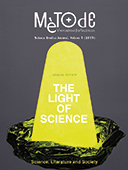Justicia distributiva y evolución. Hacia una ciencia de la igualdad
DOI:
https://doi.org/10.7203/metode.0.4047Palabras clave:
desmentir explicaciones, libertad, igualdad, fraternidad, propiedad Resumen
Resumen
Este artículo ofrece a los estudiosos de la justicia distributiva razones para interesarse por la ciencia evolutiva, que puede ayudar a entender, por ejemplo, los factores genéticos y de subsistencia que influyen en nuestras opiniones acerca de lo que es una distribución justa, el posible origen de nuestro sentido de la propiedad, por qué la libertad es importante para determinadas criaturas y por qué tenemos sentimientos fraternales e igualitarios pero sociedades desiguales.
 Descargas
Descargas
 Citas
Citas
Boehm, C., 1999. Hierarchy in the Forest. The Evolution of Egalitarian Behavior. Harvard University Press. Cambridge, Massachusetts.
Bowles, S. and H. Gintis, 2011. A Cooperative Species. Princeton University Press. Princeton/Oxford.
Brosnan, S., 2011. «Property in Non Human Primates». New Directions for Child and Adolescent Development, 132: 9-22. DOI: <10.1002/cd.293>.
Cancian, F., 1966. «Maximization as Norm, Strategy and Theory. A Comment on Programmatic Statements in Economic Anthropology». American Anthropologist, 68: 465-470. DOI: <10.1525/aa.1966.68.2.02a00110>.
Casal, P., 2011. «Love Not War. On the Chemistry of Good and Evil». In Gosseries A. and Y. Vanderborght (eds.), 2011. Arguing About Justice. Essays for Philippe Van Parijs. Louvain University Press.
Louvain-la-Neuve. Cochrane, A., 2012. Animal Rights without Liberation. Columbia University Press. New York.
De Waal, F., 2009. The Age of Empathy. Harmony. New York.
Hauser, M., 2007. Moral Minds. Harper Collins. New York.
Henrich, J. et al., 2005. «“Economic Man” in Cross-cultural Perspective: Behavioral Experiments in 15 Small-scale Societies». Behavioural and Brain Sciences, 28: 795-855. DOI: <10.1017/S0140525X05000142>.
Henrich, J.; Boyd, R. and P. Richerson, 2012. «The Puzzle of Monogamous Marriage». Philosophical Transactions of the Royal Society B: Biological Science, 367: 657-669. DOI: <10.1098/rstb.2011.0290>.
Jensen, K.; Call, J. and M. Tomasello, 2007. «Chimpanzees Are Rational Maximisers in an Ultimatum Game». Science, 318: 107-109. DOI: <10.1126/science.1145850>.
Maynard-Smith, J. and G. A. Parker, 1976. «The Logic of Asymmetric Contests». Animal Behaviour, 24: 159-175. DOI: <10.1016/S0003-3472(76)80110-8>.
Milanovic, B., 2011. The Haves and the Have-Nots: A Brief and Idiosyncratic History of Global Inequality. Basic Books. New York.
Proctor, D. et al., 2013. «Chimpanzees Play the Ultimatum Game». PNAS, 110, 2070-2075. DOI: <10.1073/pnas.1220806110>.
Rousseau, J., 2002. The Social Contract and the First and Second Discourses. Yale University Press. New Haven.
Stake, J. A., 2004. «The Property “Instinct”». Philosophical Transactions of the Royal Society B: Biological Sciences, 359(1451): 1763-1774. DOI: <10.1098/rstb.2004.1551>.
Stewart, S. and A. G. Thomas, 2013. «The Ape That Thought It Was a Peacock. Does Evolutionary Psychology Exaggerate Human Sex Differences?». Psychological Inquiry, 24(3): 137-168. DOI: <10.1080/1047840X.2013.804899>.
Wallace, B.; Cesarini, D.; Lichtenstein, P. and M. Johannesson, 2007. «Heritability of Ultimatum Game Respondent Behaviour». PNAS, 104(40): 15631-15634. DOI: <10.1073/pnas.0706642104>.
Wilkinson, R. and K. Pickett, 2010. The Spirit Level. Why Equality is Better for Everyone. Penguin. London.
Zerjal, T. et al., 2003. «The Genetic Legacy of the Mongols». American Journal of Human Genetics, 72: 717-721. DOI: <10.1086/367774>.
Publicado
Cómo citar
-
Resumen1216
-
PDF (Català)333
-
PDF188
-
PDF 192
Número
Sección
Licencia
![]()
Todos los documentos incluidos en OJS son de acceso libre y propiedad de sus autores.
Los autores que publican en esta revista están de acuerdo con los siguientes términos:
- Los autores conservan los derechos de autor y garantizan a Metode Science Studies Journal el derecho a la primera publicación del trabajo, licenciado bajo una licencia de Creative Commons Reconocimiento-NoComercial-SinObraDerivada 4.0 Internacional, que permite a otros compartir el trabajo con un reconocimiento de la autoría del trabajo y citando la publicación inicial en esta revista.
- Se permite y se anima a los autores a difundir sus trabajos electrónicamente a través de páginas personales e institucionales (repositorios institucionales, páginas web personales o perfiles a redes profesionales o académicas) una vez publicado el trabajo.





